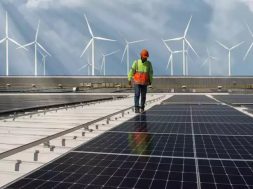
India Accelerates Clean Energy Transition with Expanding Power Grid and Renewable Capacity – EQ
In Short : India’s power transmission network expanded by 70% in the past decade, reaching 446,190 circuit kilometers. Non-fossil fuel capacity surged 180% to 217.62 GW, with solar and wind energy contributing significantly. Government initiatives, including waived transmission charges and rooftop solar programs, support renewable growth, aligning with India’s target of 500 GW non-fossil fuel capacity by 2030.
In Detail : India’s power transmission network has expanded significantly over the past decade, growing by 195,181 circuit kilometers. This expansion has increased the country’s transmission capacity from 248,554 MW in March 2014 to 446,190 MW by June 2024. As a result, India now operates as a single unified grid, allowing seamless power transfer of 118,740 MW across regions.
Alongside the expansion of the transmission network, India’s non-fossil fuel capacity has experienced remarkable growth. As of January 2025, the total installed capacity from non-fossil fuel sources has reached 217.62 GW, a sharp rise from 81 GW a decade ago. This includes substantial additions in renewable energy, with 24.5 GW of solar capacity and 3.4 GW of wind capacity installed in 2024 alone.
The Indian government has set ambitious renewable energy targets to further accelerate this growth. The country aims to achieve 500 GW of non-fossil fuel-based power capacity by 2030, ensuring that at least 50% of its electricity generation capacity comes from clean energy sources. These targets align with India’s commitments under the United Nations Framework Convention on Climate Change.
Several initiatives have been instrumental in driving this progress. The PM Surya Ghar: Muft Bijli Yojana, launched in 2024, has led to 700,000 rooftop solar installations within just ten months. The off-grid solar sector has also seen a significant boost, with a 182% increase in capacity, adding 1.48 GW in 2024 alone. These efforts have played a crucial role in expanding access to clean energy.
To further support the integration of renewable energy, the government has introduced policy measures such as waiving Inter-State Transmission System (ISTS) charges for solar and wind power sales across state borders. This has encouraged increased investment in renewable energy projects and improved distribution efficiency, ensuring that clean energy reaches all parts of the country.
India’s rapid expansion of both its power transmission network and non-fossil fuel capacity highlights its commitment to a sustainable energy future. With continued policy support, technological advancements, and increased private sector participation, the country is well on track to achieving its clean energy goals, reducing dependence on fossil fuels, and contributing to global climate action.











